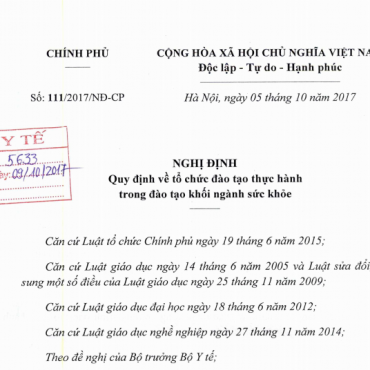Liên hệ tuyển sinh
Hợp tác Quốc tế
Autoimmune Thyroid Disease in Women
Autoimmune Thyroid Disease in Women
Jennifer S. R. Mammen, MD, PhD1; Anne R. Cappola, MD, ScM2,3
JAMA. Published online May 3, 2021. doi:10.1001/jama.2020.22196
Thyroid dysfunction is more common in women than in men. The female predominance is attributed to sex differences in immune function, similar to many autoimmune diseases. More than 80% of patients with acute or chronic thyroiditis and resulting hypothyroidism have antithyroid autoantibodies,1 as well as B-cell and T-cell infiltration of the thyroid gland, consistent with an autoimmune etiology. In a US sample, the prevalence of autoantibodies against the thyroid antigen thyroid peroxidase (TPO) ranged from 3% of teenage males and 7% of teenage females to 12% of men and 30% of women older than 80 years.2 At every age, women were twice as likely to have TPO antibodies as men, and Black women were half as likely to have TPO antibodies as White women. Although they are sensitive for thyroid dysfunction, TPO antibodies are not specific and frequently occur in the absence of thyroid dysfunction and presence of other autoimmune conditions. Antibodies against the thyroid antigen thyroglobulin are less prevalent and less strongly associated with thyroid dysfunction, while those that act as agonists for the thyrotropin receptor are pathogenic in Graves disease, which is more common in Black women. Because many individuals with TPO antibodies have normal thyroid function, other factors play a major role in determining when, if ever, thyroid dysfunction develops. For women, the profound physiologic changes associated with different life stages affect the timing of presentation of thyroid disease.
Pregnancy
Pregnancy increases thyroid hormone requirements starting in the first trimester as a result of increased thyroid hormone metabolism by placental deiodinases, estrogen-stimulated increases in serum thyroid-binding globulin (TBG), and a larger volume of distribution. Cross-reactivity of β-human chorionic gonadotropin at the thyrotropin receptor directly stimulates thyrocytes to help meet this demand. Due to higher TBG levels, total thyroxine levels are generally elevated. Thyrotropin remains the preferred thyroid test measure during pregnancy. Trimester-specific reference ranges reflect the lower average thyrotropin in early pregnancy.
Women with decreased thyroid reserve (eg, from iodine deficiency or autoimmunity) may not be able to compensate fully for the increase in thyroid hormone demand during pregnancy, leading to thyrotropin elevation. It is essential that women take a prenatal vitamin with 150 μg of potassium iodide, preferably starting prior to pregnancy and continuing through lactation. Thyroid dysfunction has been associated with infertility and early pregnancy loss. Therefore, thyrotropin testing is recommended prior to assisted reproductive technology and during pregnancy in women with risk factors for thyroid dysfunction.3 In women newly found to have elevated thyrotropin during pregnancy, autoimmunity should be assessed as a predictor of thyroid reserve. The American Thyroid Association proposes treatment thresholds at thyrotropin greater than 4 mIU/L in women with TPO antibodies and thyrotropin greater than 10 mIU/L in women without TPO antibodies, with a treatment goal of thyrotropin less than 2.5 mIU/L.3
The majority of women already receiving levothyroxine will require an increased dose early in the first trimester of pregnancy. Doubling the daily dose 2 days each week (a 28% increase in total dose) at the time of a positive pregnancy test result anticipates the increased requirements well.3 For women receiving treatment, thyrotropin should be tested every 4 weeks through 20 weeks’ gestation and once at approximately 30 weeks’ gestation.
An increased incidence of autoimmune disease in the postpartum period is attributed to a rebound of the immune system, which is suppressed during pregnancy to protect the fetus. Postpartum thyroiditis occurs in 5% of all women after delivery, up to half of whom will have persistent hypothyroidism 1 year later.3 In women with Graves disease, lower doses of antithyroid drugs are usually required throughout pregnancy, with increased doses after delivery. All women with a history of Graves disease should have the thyrotropin receptor antibody checked during pregnancy. Women who increased their levothyroxine dose during pregnancy should return to their prepregnancy dose after delivery, and women who initiated levothyroxine during pregnancy and are receiving 50 μg or less may be able to discontinue it completely.
Fertility
The prevalence of TPO antibodies is increased in women with infertility and in those with a history of early miscarriage, raising the question of whether thyroid autoimmunity itself negatively affects reproductive health. Randomized trials of early thyroid hormone replacement showed no effects on pregnancy outcomes in euthyroid women with TPO antibodies.4,5 TPO antibodies may signal the presence of increased inflammation without contributing directly to poor outcomes in pregnancy.
Midlife
There are few data to guide the treatment of women aged 40 to younger than 60 years. During the menopause transition, decreases in estrogen levels result in decreased production of TBG. This decrease reduces the amount of thyroid hormone required to maintain free thyroid hormone levels, thereby reducing demand on the thyroid, but whether this reduction alters the thyrotropin set point is not known. Common but nonspecific symptoms, such as fatigue and weight gain, drive a large proportion of thyrotropin testing. Before treatment of an isolated elevated thyrotropin level (with free thyroxine level in the reference range), persistence should be confirmed on repeated testing after 1 to 3 months for thyrotropin level less than 15 mIU/L and after 1 to 2 weeks for thyrotropin level of 15 mIU/L or higher, in light of a high frequency of spontaneous resolution of thyrotropin elevations on repeated testing results.6 In addition, if there is a lack of sustained symptomatic improvement with therapy, alternative explanations for persistent symptoms should be sought and discontinuation of levothyroxine considered for those with thyrotropin level less than 7 mIU/L prior to initiation.
Aging
A shift in the distribution of thyrotropin to higher levels with age, even in individuals without TPO antibodies,2 and increased life expectancy in women lead to a high prevalence of mildly elevated thyrotropin levels in older women. However, these elevations in thyrotropin may not represent thyroid dysfunction. Even in healthy older adults, an increase in thyrotropin may reflect hypothalamic and pituitary adaptation to physiologic stressors, such as chronic inflammation or altered circadian rhythm.7 Observational data suggest no adverse consequences to leaving thyrotropin levels of 4.5 to 7 mIU/L untreated.6 A randomized trial of thyroid hormone therapy for adults aged 65 years or older with a median thyrotropin level of 5.8 mIU/L showed no symptomatic benefit.8 Thus, the degree and persistence of thyrotropin elevation should be considered prior to initiation of levothyroxine therapy.6 Furthermore, excessive levothyroxine doses, which increase the risk of arrhythmia and fracture,9 are more common in older women than in older men (25.2/1000 vs 4.8/1000 person-years of levothyroxine exposure),10 suggesting a need for a greater attention to levothyroxine dosing in women.
Conclusions
Appropriate interpretation of thyroid function tests and management of thyroid dysfunction is a significant women’s health issue (Box). Correct identification and management of thyroid disease during pregnancy has maternal and fetal health consequences. In nonpregnant women, the degree and persistence of thyrotropin elevation, age, and other mitigating factors need to be considered prior to initiating levothyroxine replacement.6 Understanding changes in physiology across the lifespan allows physicians to optimize the care of women with thyroid disease.
Thyroid Disease in Women
-
Thyroid autoimmunity has a higher prevalence in women and with increasing age.
-
Interpretation of thyroid function test results requires the context of the life stage, including pregnancy and aging.
-
Autoimmunity may contribute to decreased thyroid reserve, lowering the threshold at which thyroid hormone supplementation is appropriate during pregnancy.
-
Age-associated changes affect the threshold at which thyroid hormone supplementation is appropriate in older women.
Submissions: The Women's Health editors welcome proposals for features in the section. Submit yours to ccrandall@mednet.ucla.edu.
Corresponding Author: Anne R. Cappola, MD, ScM, Division of Endocrinology, Diabetes, and Metabolism, Perelman School of Medicine at the University of Pennsylvania, 3400 Civic Center Blvd, Bldg 421, Translational Research Center, 12th Floor, Philadelphia, PA 19104-5160 (acappola@pennmedicine.upenn.edu).
Published Online: May 3, 2021. doi:10.1001/jama.2020.22196
Conflict of Interest Disclosures: Dr Mammen reported having stock holding in Bristol Myers Squibb outside the submitted work. No other disclosures were reported.
Disclaimer: Dr Cappola, Associate Editor of JAMA, was not involved in any of the decisions regarding review of the manuscript or its acceptance.
References
1.Spencer CA, Hollowell JG, Kazarosyan M, Braverman LE. National Health and Nutrition Examination Survey III thyroid-stimulating hormone (TSH)-thyroperoxidase antibody relationships demonstrate that TSH upper reference limits may be skewed by occult thyroid dysfunction. J Clin Endocrinol Metab. 2007;92(11):4236-4240. doi:10.1210/jc.2007-0287PubMedGoogle ScholarCrossref
2.Hollowell JG, Staehling NW, Flanders WD, et al. Serum TSH, T(4), and thyroid antibodies in the United States population (1988 to 1994): National Health and Nutrition Examination Survey (NHANES III). J Clin Endocrinol Metab. 2002;87(2):489-499. doi:10.1210/jcem.87.2.8182PubMedGoogle ScholarCrossref
3.Alexander EK, Pearce EN, Brent GA, et al. 2017 Guidelines of the American Thyroid Association for the diagnosis and management of thyroid disease during pregnancy and the postpartum. Thyroid. 2017;27(3):315-389.Google Scholar
4.Dhillon-Smith RK, Middleton LJ, Sunner KK, et al. Levothyroxine in women with thyroid peroxidase antibodies before conception. N Engl J Med. 2019;380(14):1316-1325. doi:10.1056/NEJMoa1812537PubMedGoogle ScholarCrossref
5.Wang H, Gao H, Chi H, et al. Effect of levothyroxine on miscarriage among women with normal thyroid function and thyroid autoimmunity undergoing in vitro fertilization and embryo transfer: a randomized clinical trial. JAMA. 2017;318(22):2190-2198. doi:10.1001/jama.2017.18249
ArticlePubMedGoogle ScholarCrossref
6.Biondi B, Cappola AR, Cooper DS. Subclinical hypothyroidism: a review. JAMA. 2019;322(2):153-160. doi:10.1001/jama.2019.9052
ArticlePubMedGoogle ScholarCrossref
7.Mammen JS, McGready J, Ladenson PW, Simonsick EM. Unstable thyroid function in older adults is caused by alterations in both thyroid and pituitary physiology and associated with increased mortality. Thyroid. 2017;27(11):1370-1377. doi:10.1089/thy.2017.0211PubMedGoogle ScholarCrossref
8.Stott DJ, Rodondi N, Kearney PM, et al; TRUST Study Group. Thyroid hormone therapy for older adults with subclinical hypothyroidism. N Engl J Med. 2017;376(26):2534-2544. doi:10.1056/NEJMoa1603825PubMedGoogle ScholarCrossref
9.Mammen JS, McGready J, Oxman R, Chia CW, Ladenson PW, Simonsick EM. Thyroid hormone therapy and risk of thyrotoxicosis in community-resident older adults: findings from the Baltimore Longitudinal Study of Aging. Thyroid. 2015;25(9):979-986. doi:10.1089/thy.2015.0180PubMedGoogle ScholarCrossref
10.Flynn RW, Bonellie SR, Jung RT, MacDonald TM, Morris AD, Leese GP. Serum thyroid-stimulating hormone concentration and morbidity from cardiovascular disease and fractures in patients on long-term thyroxine therapy. J Clin Endocrinol Metab. 2010;95(1):186-193. doi:10.1210/jc.2009-1625PubMedGoogle ScholarCrossref
Source: https://jamanetwork.com/journals/jama/fullarticle/2779750?guestAccessKey=49673ad4-b307-4e2d-b962-2cbb7ef1254f&utm_source=silverchair&utm_medium=email&utm_campaign=article_alert-jama&utm_content=olf&utm_term=050321














